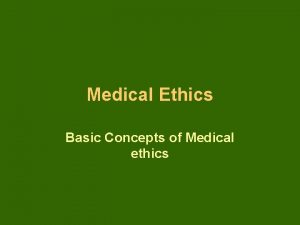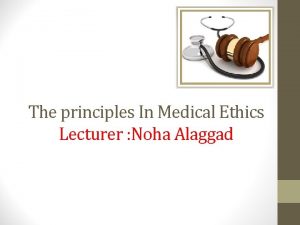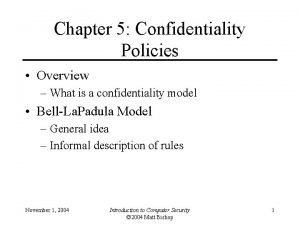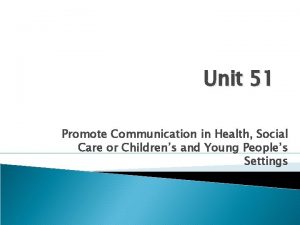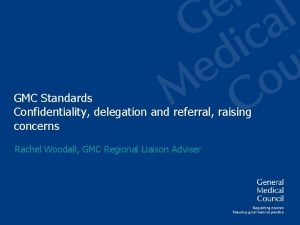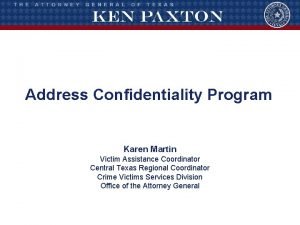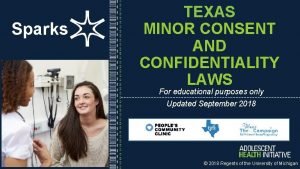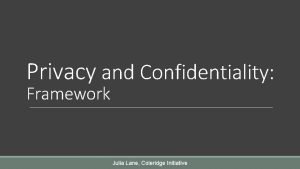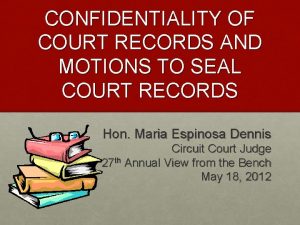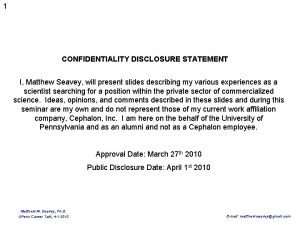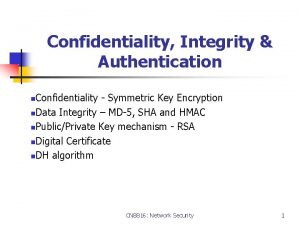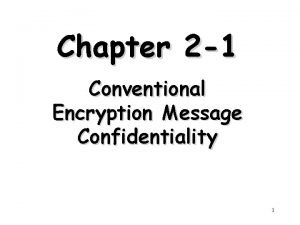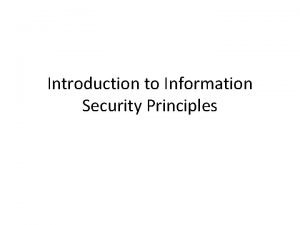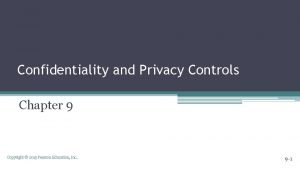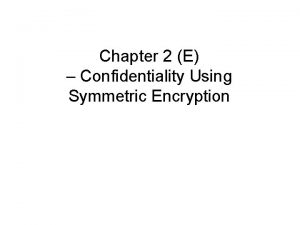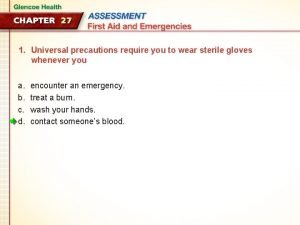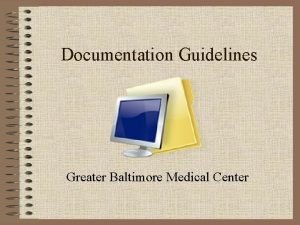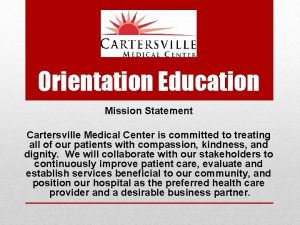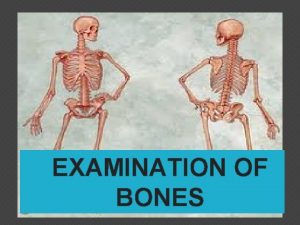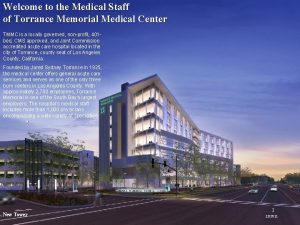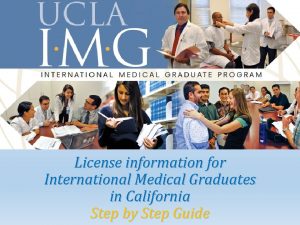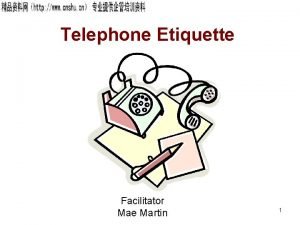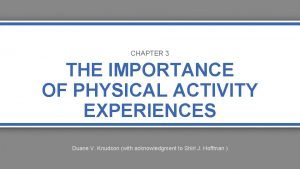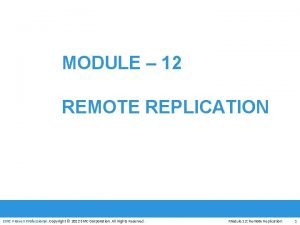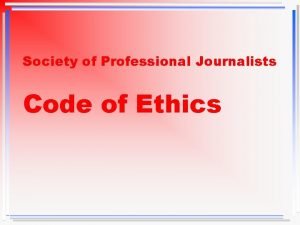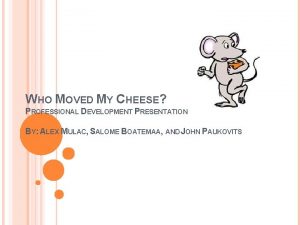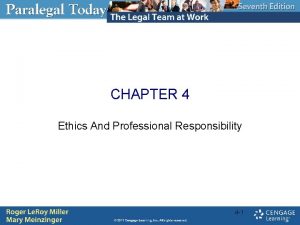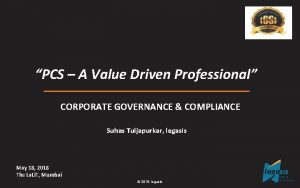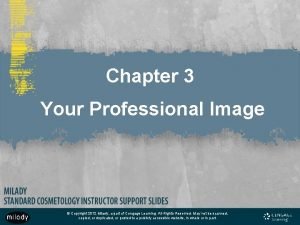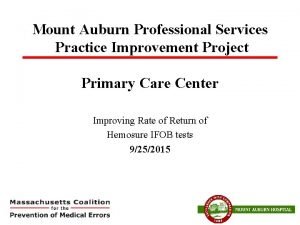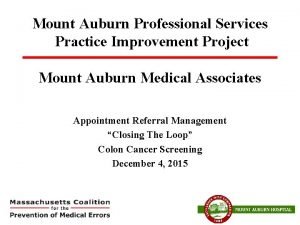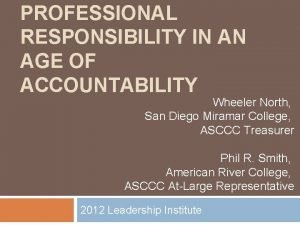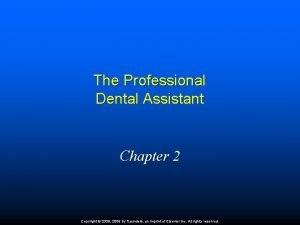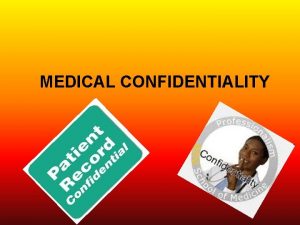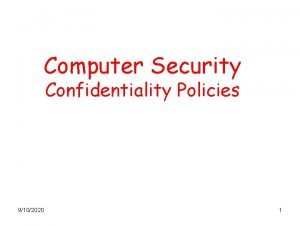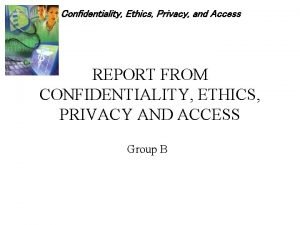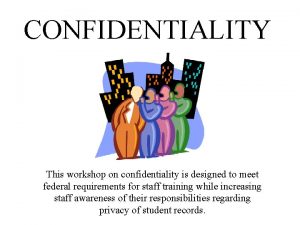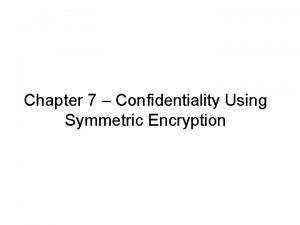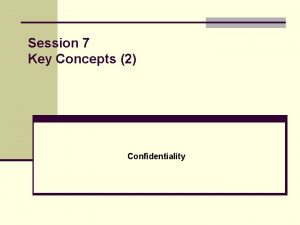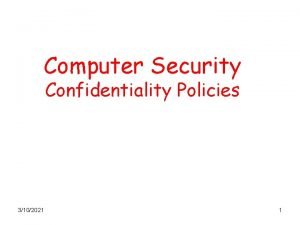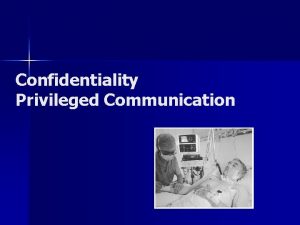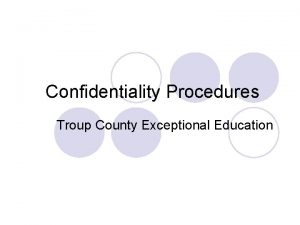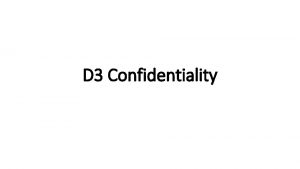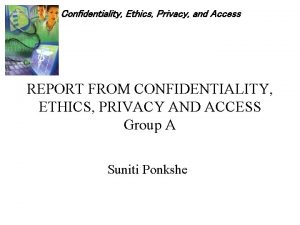MEDICAL CONFIDENTIALITY Medical Confidentiality Professional Secrecy It is

































































- Slides: 65

MEDICAL CONFIDENTIALITY


Medical Confidentiality Professional Secrecy ������ It is the right of an individual to have his personal, identifiable medical information kept private.

Confidentiality • A health care provider is not allowed to disclose patient’s information to others unless the individual has given specific permission for such release. • Such information should be available only to the treating physician and other medical personnel involved in the patient's care. • Children, elderly, mentally disabled and the dead all have the same right to confidentiality.

Medical confidentiality includes: - Identifiable material in the medical records e. g. written records, photographs, video films. -Identifiable material held in the doctor's head. Oral information obtained from the patient or his relatives.

Medical confidentiality includes: - Information about the disease: (type, cause, diagnosis, treatment type or place, prognosis, complications). - Information not related to the disease: (personal, social, economic). Anything affect reputation

• Case study: A physician sees his assistant on a social occasion. The assistant wanted to discuss the case of a particular patient. He was being very specific using the patient's name and personal data. What should the physician do?

• Cut this conversation off as soon as possible! and tell your co-worker that the whole conversation is inappropriate as he should postpone the conversation until they meet at the hospital, as discussion of the problem of an identified patient in public places is unethical, as it violates confidentiality. • Doctors are not free to disclose information about patient's health in front of persons who are not involved in patient's care without consent of the patient. • Discussion of the illness of a patient with others, is forbidden except for medical consultation after patient’s permission

• Imagine that you are taking care of a patient and a lady claiming to be his daughter calls on the phone to see how the patient is and what is going on with him. ” The patient is asleep” What do you say? Would it be against confidentiality if you answer her questions ? • Yes , It is breach of confidentiality, unless that patient listed that family member can receive medical information about them.

• You see your Aunt at the hospital where you are working at. Can you tell your mom about it? • A: No. your Aunt may be visiting; but then again, she may be having investigations done. She may not want the family to know about the tests until she knows the outcome. She has the right not to tell the family. It is up to her to tell the family – not you. • A simple statement like “I saw my Aunt at the hospital today” can lead to a major breach of her right to privacy.

Medical Confidentiality • Respect for confidentiality is firmly established in codes of medical ethics. • Breach of confidentiality is not only unethical, it is also illegal. • Confidentiality as related to health care dates back to the Hippocratic Oath:

Medical Confidentiality Hippocratic oath What I may see or hear in the course of the treatment or even outside of the treatment in regard to the life of men, which on no account one must spread abroad, I will keep to myself, holding such things shameful to be spoken about". "





Importance of medical confidentiality: 1 - Respects patient's autonomy. (Autonomy is the right of the competent individual to choose actions regarding his own health and future. These actions are consistent with his values, goals, and life plan). 2 -Respects natural human desire for privacy.

Importance of medical confidentiality: 3 -Protects from social embarrassment, discrimination, or stigmatization. 4 - Prevents misuse of information against patient. 5 - Builds confidence between doctor and patient.

Breach of confidentiality Disclosure • It means that a physician discloses patient data that he has learned within the physician-patient relationship to other parties without patient consent or court order.

Breach of confidentiality • Breach of medical confidentiality resulting in physical, psychological or financial harm to the patient. • It subjects physicians to punishment by law.

• There are three points that should be considered in accusing a physician of divulging patient’s secret : 1. There was revealing of a secret. 2. The secret was known to the physician through his profession. 3. The disclosure of the secret lead to harm or damage to the patient (physical or psychological).

When can confidentiality be breached? Confidentiality is NOT an absolute obligation. Situations arise where the harm in maintaining confidentiality is GREATER than that brought by disclosing information.

Disclosure of professional secrecy may be permitted in cases of: I- Concern for public safety. For the sake of the community 2 -Concerns for safety of patients or other specific persons.

Case study: A patient has been tested positive for Hepatitis. He asks his physician not to report his case or he will lose his job. What is the ethical behavior that should be adopted by the physician in such a case?

• The physician should report the case to the health authorities as it imposes a great risk on public health.

Principles that should be followed on allowing breach of confidentiality 1. 2. 3. 4. It must be to proper authorities. Not beyond what is required or relevant. Reason for disclosure must be documented in the medical records. Patients are informed about such disclosure.

Breach of confidentiality may be allowed in the following conditions For the sake of the community For the sake of the patient

For the sake of the community - Required by Law: 1 -Notification of births and deaths. 2 -Infectious diseases (HIV, hepatitis).

For the sake of the community 3 - In case of accidents: (e. g. where a doctor has concerns over a patient’s fitness to drive, RTAs involving drugs/alcohol).

For the sake of the community 4 - In case of poisoning: (e. g. when a doctor has a patient attempting suicide by taking a poison to end his life. The doctor has to disclose this information to the patient’ family to take care if the patient tries to commit suicide another time).

For the sake of the community 5 - In criminal cases: To prevent occurrence of 6 - Order of court. crimes e. g. murder.

7 - In case of medical malpractice and compensation: * (Medical malpractice is the failure of medical professionals to provide adequate treatment to patients resulting in injury or death of the patient). * (Compensation is money given or received by the patient as payment or reparation for injury).

For the sake of the community 8 -Psychotic patients with violent tendency.

For the sake of the community 9 -To safeguard national security e. g. terrorist activity.

For the sake of the patient 1 -Victims of neglect or abuse e. g. child abuse. (The doctor should report the case to the authorities to prevent further harm to the child).

For the sake of the patient 2 -In times of emergency: (which may require an attending doctor to provide the identity of patients he/she has treated following a road traffic accident).

For the sake of the patient 3 -To prevent harm to patient( Patient requiring special care)e. g epilepsy, psychotic patients. 4 -If the patient is incompetent or minor, information is normally delivered to parents or guardians.

• What if a family member asks how the patient is doing? • It is generally unjustifiable to do so. Except in cases where the spouse is at specific risk of harm directly related to the diagnosis, it remains the patient's, rather than the physician's, obligation to inform the spouse.

• Your cousin was admitted to the emergency room during your shift at the hospital. He is in critical condition. Your mother is very concerned about him, You know about your cousin’s condition. Do you tell your mom? A: No. you must not tell. Even doctors can only release information to the immediate family—in this case, your cousin’s parents. It is up to them to inform the rest of the family.

summary

Medical confidentiality • Secrecy is now termed "confidentiality“ • BMA defines confidentiality as : "The principle of keeping secure and secret from others, information given by or about an individual in the course of a professional relationship“ • If there is no trust, patients are not able to reveal everything, and the clinical history will be deficient or even misleading. • Not inheritable.

• Confidentiality not only duty of physicians but also pharmacists, medical students, nurses and assistants. • All medical records, prescriptions, hospital papers and lab reports should be kept away from irresponsible hands.

Health care information may only be disclosed in the following situations: (1) The patient's permission. (2) The patient's best interest. • Close relative who has to care for the patient at home. • Patient is the victim of physical or sexual abuse or of neglect. 3) The public interest: • In case of wounds and injuries (assailant). • In case of diseases.

(4) The doctor's interest: (accused in malpractice). (5) In courts of law: • If a doctor is an expert witness • In case of forensic medical examiners (6) Statutory (legal) requirement: It includes: • Official notification of births, deaths and still births. • Statutory notification of infectious and occupational diseases.

Ways in which medical professionals can guard patient confidentiality: 1 - Never disclose information to a third party without signed consent (this includes insurance companies, attorneys, employers, curious neighbors) 2 - Never reveal financial information about a patient including account balance—this is confidential! 3 - When talking on the telephone to a patient, do not use the patient’s name if others in the room might overhear.

4 - When leaving a message on a home answering machine or at a patient’s place of employment, simply ask the patient to return a call. No mention should be made concerning results of medical tests. 5 - Do not leave medical charts or insurance reports where patients or office visitors can see them. 6 - Safeguards computerized patient’s records (use codes, passwords)

• Physicians who perform autopsies or have access to autopsy reports should maintain confidentiality of information except when laws regarding disclosure to public health and at-risk third parties are appropriate. • Confidentiality of minors may be ethically breached when parents need to be informed of treatment or serious illness.



Medical reports & certificates § Registered practitioners are in certain cases bound to give certificates, notifications, reports or other documents, signed by them, for use in courts or for administrative purposes. § A complete, accurate, and authoritative report can be obtained only by careful preparation and by a thorough understanding on the part of the physician as to what should be included in the report. § The criminal law is accusing any physician or surgeon who is writing a medical report or certificate, which is not true as forgery by prison.

There are certain circumstances in which a physician is asked to issue a medical report or certificate: e. g. 1 -Birth certificate: including date and place of birth, sex of the baby, name of father and mother. 2 -Vaccination: including type and time. 3 -It is the duty of a physician to report to the health authorities all suspected cases of contagious disease so that proper examination may be made by experts and the public health protected. 4 -Work accident: reporting the cause of accident, the effects, any infirmity and time of absenteeism.

5 -Injuries: including personal data and data related to the injury; type of wound, site, causative instrument, associated lesions and complications & expected time for cure. 6 -Occupational disease: reports include type of disease and need for diminishing effort or change of work and time needed for rest. 7 -Age determination: to evaluate criminal responsibility and for free consent in rape. 8 -Test for sanity. 9 -Sick - leave reports for students. 10 -For insurance.

11 -Death certificate: The physician must sign a certificate giving the cause of death of a deceased person on whom he has been in professional attendance. It is forbidden for a physician to sign a death certificate in certain cases; a. In any violent death, whether homicidal, suicidal or accidental. b. In any death in which the physician has not been in attendance or in which he is unable to establish the cause of death with reasonable clinical probability. c. In any death in which it appears that a criminal act may have been a contributing cause. Such cases must be referred to the designated medicolegal authority.

Legal rules that should be followed on issuing a medical report or certificate: 1 -It should be given to the patient himself except when he is incompetent due to underage or insanity; in these cases it is given to his guardian. 2 -It should be accurate, honest and includes the correct and complete information about the condition. 3 -It should not entail any personal expectation but should be based on the utmost scientific standards. It should be issued after using the best skill of knowledge of the physician. 4 -It should include in details all the data that have been asked for.

5 - It should not include any dictated data by any person. 6 -The physician should be sure of the identity of the person he is giving the report to. 7 -He should not sign the certificate if he is not the one who wrote it except after thorough revision. A physician should certify only that which he has personally verified. Any practitioner who signs such certificate which is untrue, misleading or improper, is liable to have his name erased from the register.

8. In case of age-estimation certificates for marriage, certificate must show name, photo and finger print of the person and is given to the patient him self (not to relative).



Guidelines for clinicians on medical records and notes

Medical records provide: a) b) c) d) e) f) Full details about patient age address sex… A means of communicating information between the attending doctors and the health care workers dealing with the patient Documentary evidence of the patient’s illness, treatment and response to treatment Information for review, study, evaluation for care given to the patients Protection of the legal interests of the patients, hospitals and health care workers A database for medical education and research

I. Each hospital record should contain the following identification data: 1. Number on every page 2. Name in full on every page 3. Address 4. Telephone number 5. Date of birth 6. Sex 7. Person to notify in an emergency 8. Occupation and marital status 9. The patient’s registered medical practitioner

2. The clinical record: 1. The notes should include the following details: q q Initial history (previous illness, and details of medication) Initial physical examination, including patient’s height and weight A working diagnosis and medical care plan q 2. 3. Notes supplemented and updated regularly to include details and reports of all investigations, treatments and verbal advice given to the patient and his relatives An entry must be made on discharge recording the clinician responsible for the decision, the status and destination of the patient, and arrangements for follow up. A copy of the preliminary discharge letter should be filled in the notes.

6. Details on discharge: 1. 2. All patients should take with them a brief summary note (name of the consultant in charge, operation, diagnosis, current ongoing medication and arrangements for wound management). Discharge summary/letter which is completed within 14 days of the patients discharge. Includes a précis of the clinical notes, the full diagnosis and the name of the consultant in charge. This is sent to the general practitioner, hospital of institution to which the patient is discharged.

3. When a patient dies a similar documentation should be completed and sent to the patient’s general practitioner. 4. Details of the death certificate entry should be written into the patient’s notes.

 Why is confidentiality important
Why is confidentiality important Communication theory of secrecy systems
Communication theory of secrecy systems Everlasting wireless
Everlasting wireless Confidentiality in medical ethics
Confidentiality in medical ethics Principles of medical ethics
Principles of medical ethics Confidentiality chapter 5
Confidentiality chapter 5 Potential tension between maintaining confidentiality
Potential tension between maintaining confidentiality Gmc confidentiality
Gmc confidentiality Confidentiality
Confidentiality Address confidentiality program texas
Address confidentiality program texas Texas confidentiality laws for minors
Texas confidentiality laws for minors Gus.uams
Gus.uams Julia lane coleridge
Julia lane coleridge Confidentiality disclaimer presentation
Confidentiality disclaimer presentation Notice of confidential info rule 2-420
Notice of confidential info rule 2-420 Matthew seavey
Matthew seavey Confidentiality
Confidentiality Vector solutions ferpa answer key
Vector solutions ferpa answer key Netiquette of confidentiality and respect
Netiquette of confidentiality and respect Symmetric key
Symmetric key Conventional encryption and message confidentiality
Conventional encryption and message confidentiality Confidentiality integrity availability
Confidentiality integrity availability Confidentiality and privacy controls
Confidentiality and privacy controls Principle of fidelity
Principle of fidelity Confidentiality using conventional encryption
Confidentiality using conventional encryption You should always seek professional medical care for
You should always seek professional medical care for Gbmc medical records
Gbmc medical records Cartersville medical center medical records
Cartersville medical center medical records Difference between medical report and medical certificate
Difference between medical report and medical certificate Torrance memorial transitional care unit
Torrance memorial transitional care unit Ptal california medical board
Ptal california medical board Asce professional liability insurance
Asce professional liability insurance Nsgc professional status survey
Nsgc professional status survey Massachusetts association for professional law enforcement
Massachusetts association for professional law enforcement Vslang
Vslang Purpose of memo
Purpose of memo Domain 4: professional responsibilities examples
Domain 4: professional responsibilities examples Clothes and personal appearance
Clothes and personal appearance Acca syllabus and papers
Acca syllabus and papers Directed energy professional society
Directed energy professional society Professional etiquette for teachers
Professional etiquette for teachers Intellectual property in professional practices
Intellectual property in professional practices Professional voicemails
Professional voicemails Professional experience in physical activity
Professional experience in physical activity Maintaining a professional image
Maintaining a professional image Ccea professional associates
Ccea professional associates Ethics and professional responsibility cpd
Ethics and professional responsibility cpd Professional hydraulics
Professional hydraulics Emc proven professional
Emc proven professional Business etiquette definition
Business etiquette definition Society of professional journalists code of ethics
Society of professional journalists code of ethics Who moved my cheese character traits
Who moved my cheese character traits Rubric for writing an email
Rubric for writing an email Office 2007 visio
Office 2007 visio Value driven professional
Value driven professional Nala paralegal canons of ethics
Nala paralegal canons of ethics Value driven professional
Value driven professional Milady chapter 3 your professional image
Milady chapter 3 your professional image Certified global business professional exam
Certified global business professional exam Mt auburn primary care center
Mt auburn primary care center Examples of occupational crime
Examples of occupational crime Mount auburn professional services
Mount auburn professional services Professional responsibility
Professional responsibility Professional ethics presentation
Professional ethics presentation The adaa was formed in 1924 by:
The adaa was formed in 1924 by: Professional capital definition
Professional capital definition



